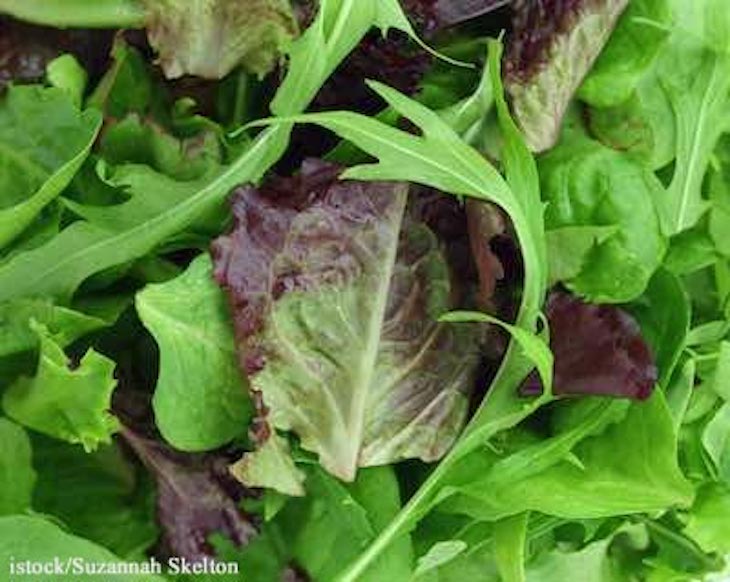Three packaged salads food poisoning outbreaks have ended 2021. While we got through the year without an E. coli outbreak specifically and officially linked to romaine lettuce, there are still seven unsolved outbreaks on the FDA’s CORE Outbreak Investigation Table.

In fact, there were five food poisoning outbreaks linked to packaged salad leafy greens in 2021: Josie’s Organics Baby Spinach with E. coli O157:H7 that is still ongoing, Dole Salads with Listeria monocytogenes that is ongoing, Fresh Express with Listeria monocytogenes that is ongoing, Simple Truth and Nature’s Basket Power Greens with E. coli O157:H7 that is ongoing, and BrightFarms salad with Salmonella that ended in August.
Three Packaged Salads Food Poisoning Outbreaks
The last three outbreaks linked to leafy greens were all disclosed by the FDA and CDC in the last week of 2021. The outbreaks had been on the FDA CORE Table before they were matched with a product.
The deadly Fresh Express Listeria monocytogenes outbreak has sickened at least 10 people in eight states. All ten have been hospitalized, and one person, who lived in Pennsylvania, died. Illness onset dates ranged from July 26, 2016 through October 19, 2021. This very long range can be common in Listeria monocytogenes outbreaks, since this reportable illness is logged in PulseNet, but until at least two people are sickened with the same strain, the government does not declare an outbreak. A recall has been issued for Fresh Express salads made at its Streamwood, Illinois facility. The outbreak strain was found in a package of Fresh Express romaine sweet butter lettuce mix by the Michigan Department of Agriculture.
The deadly Dole bagged salads Listeria monocytogenes outbreak has sickened at least 16 people in 13 states and has killed two people who lived in Wisconsin and Michigan. Twelve people were hospitalized. Illness onset dates range from August 16, 2014 to October 17, 2021. The Georgia Department of Agriculture found the outbreak strain of Listeria monocytogenes in a Dole garden salad as part of a routine sampling program. All Dole branded salads processed at their facilities in Bessemer City, North Carolina and Yuma, Arizona have been recalled. The salads were sold under many brand names including Kroger, Little Salad Bar, Marketside, and Simply Nature, among others.
And finally, the E. coli O157:H7 outbreak linked to Simple Truth and Nature’s Basket Power Greens has sickened at least 13 people in six states. One person has developed HUS, which is a type of kidney failure. Both of these packaged salads have a mix of these organic greens: spinach, mizuna, kale, and chard. No recall has been issued or requested because the salads have an expiration date of December 20, 2021 and the government believes that they are no longer available.
Why Leafy Greens?
Why are leafy greens so susceptible to contamination? First of all, these greens are a raw agricultural product, and can be contaminated in many ways: through animals in the field, through runoff from factory farms, from contaminated irrigation water, in processing, and in transportation.
Second, if just one or two heads of lettuce are contaminated, processing can mix that bacteria all through many batches, which means the contamination an cause multistate outbreaks. The more any food is handled, the greater the risk of contamination.
And finally, the nature of the product lends itself to contamination. The deep crenelation and folds in greens provide many places for bacteria to hide and hold on. And any tear or rip in a leaf can be an entry point for bacteria, so they can get into the cells and hide from any cleaning process. Romaine lettuce is especially susceptible since it grows in the shape of a cup that holds water, giving time for pathogens that may be in that water to make their way into the plant.
The FDA did release a 2020 Leafy Greens Action plan after three E. coli O157:H7 outbreaks were linked to romaine lettuce in 2019. That plan focuses on agricultural water safety. It has been criticized by consumer groups as not going far enough, and those groups have been especially critical of the water testing rule delay.
How can you protect yourself?
These three packaged salads food poisoning outbreaks are disconcerting. It can be difficult to avoid illness when you eat leafy greens, although it is important to remember that the number of people sickened by this product is small considering how many tons of greens are eaten in this country every year. And leafy greens are a healthy food. Still, that’s of small comfort for those who have been seriously sickened by these products.
The best advice is to watch recall notices and outbreak investigations carefully. Experts say that if you buy packaged salads, buy the ones with the use by date as far in the future as possible. Avoid any packages where the greens look wet or there are broken or damaged pieces. Store the bag in the fridge and eat it within a day or two.
If you buy whole heads of lettuce and greens, avoid damaged heads and any heads with bruised or torn leaves. Remove the outer leaves and discard them. Wash them thoroughly with cool running water, dry them, and eat them within a day or two.
Consider buying greenhouse grown leafy greens, or hydroponic greens, although the BrightFarms Salmonella outbreak was linked to greenhouse greens. Generally, these products may be safer, but the safety depends on whether the company is following proper food safety practices.
You can cook your greens, which will kill bacteria. They should be heated until they are wilted. This works best with sturdy greens such as spinach and kale.
Some experts say that soaking greens in vinegar will kill pathogens. Unfortunately, it will not kill all bacteria that may be on the product. Salad rinses will not destroy pathogens.
Some people, especially those in high risk groups such as the elderly and people with compromised immune systems, may want to avoid eating raw leafy greens altogether.
And always avoid cross-contamination between raw meats, poultry, and eggs, and leafy greens and other foods that are eaten raw.

If you or a loved one have been sickened with a Salmonella, Listeria monocytogenes, or E. coli O157:H7 infection after eating leafy greens, please contact our experienced attorneys for help at 1-888-377-8900 or text us at 612-261-0856. Our firm represents clients in lawsuits against grocery stores and food processors, and families in wrongful death cases




